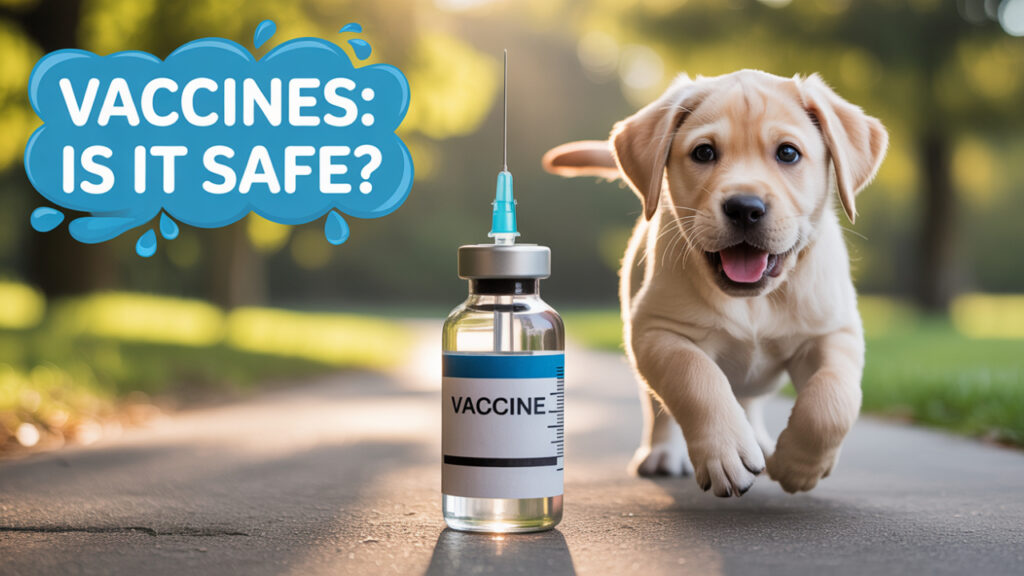Side effects of shots in dogs may range but are typically mild such as swelling, fever or lethargy. These reactions tend to be temporary and self-resolving. Other dogs might have other, more serious side effects — like allergic reactions or gastrointestinal problems. Knowing these potential impacts is essential for pet owners, as it aids in observing your dog’s health post-vaccination. Frequent vet visits and transparent dialogue with your vet can guarantee that any negative reactions are managed quickly.
Understanding Canine Vaccine Side Effects
Knowing about potential side effects of dog vaccinations can help owners respond to severe reactions.
1. Mild Reactions
Typical mild reactions to dog vaccinations include soreness at the injection site and slight lethargy. After vaccination time, most dogs will show a slight fever or reduced appetite that quickly dissipates. If your pup received a nasal vaccine in particular, sneezing can be a normal vaccine reaction. Be on the lookout for any transient symptoms within a couple of hours of vaccination, as the majority of side effects from canine vaccines are mild and usually resolve within 24 hours.
2. Moderate Reactions
Moderate reactions to dog vaccinations can include localized swelling or redness at the injection site. Certain dogs, especially small breeds and Boxers, may develop mild vomiting or diarrhea following their vaccination time. Signs of discomfort or irritability can indicate a moderate vaccine reaction. Keeping a record of these reactions is helpful for future vet visits, as some dogs are more prone to adverse reactions due to genetics.
3. Severe Reactions
Serious reactions, while uncommon, may consist of anaphylaxis, a life-threatening condition. These can include signs of breathing difficulty, facial swelling, or even collapse immediately post-vaccination. Such severe reactions necessitate prompt veterinary care, especially during routine vaccinations. Knowing what to do in an emergency is a must, since life-threatening allergic reactions can happen within minutes to hours of vaccination. Be watchful so your canine companion gets the care it needs if serious symptoms develop.
4. Delayed Reactions
Delayed reactions, which can occur 24 to 48 hours after vaccination, are rare but can include serious reactions such as malaise and allergic reactions after the primary vaccination. While these potential side effects can be serious, they warrant attention from an experienced vet. It’s crucial to monitor your pup post-vaccination for any unusual changes and seek medical advice if needed.
How to Spot a Reaction
Recognizing a vaccine reaction in dogs requires careful observation of both physical and behavioral signs. Knowing these symptoms will allow you to react quickly and get your pup the care he needs.
Physical Signs
Watch for swelling or redness or tenderness in the vaccination site. These signs can emerge within minutes to hours of the shot but may manifest up to 48 hours later. Or that mild side effects such as a low grade fever or lethargy are a sign of your normal reaction.
Watch for weird post-vaccination bumps or lumps, which can take up to two weeks to disappear. If your dog seems uncomfortable, whines or won’t allow you to touch around the injection site, these could indicate a reaction.
Behavioral Changes
Notice any alterations in your dog’s habits — they might start acting irritable or become reclusive. If your dog abruptly loses interest in food or play, it may be a reaction.
Look for indications of nervousness or uneasiness, which could mean unease post-injection. Observe any unusual behavior in your dog’s normal routine, as this can be an indicator of their health after vaccination.
When to Call a Vet
Call your vet right away if you observe severe symptoms like trouble breathing or collapsing. These allergic reactions, though rare, can be life-threatening.
Contact your vet if light symptoms last more than a couple days or get worse. If your dog doesn’t appear to stabilize within a few days of vaccination, contact for advice. Let your vet know about possible vaccine reactions early.
Which Shots Cause Reactions
Vaccination is key in helping protect your dog from different diseases, but some typical dog vaccines are more likely to cause vaccine reactions than others. Knowing what shots can lead to serious reactions aids dog owners in making educated decisions for their canine companions.
Core Vaccines
Core vaccines are all dogs, like rabies and canine distemper. They tend to be much less likely to cause a reaction than the non-core options.
Nevertheless, vigilance is still key after core vaccinations. Reactions are possible, but mild. Talk to your vet about the need for and timing of these core vaccines, particularly considering your dog’s lifestyle and exposure risk.
Non-Core Vaccines
Non-core vaccines like kennel cough tend to have more reactions. Consider these vaccines as needed, depending on your dog’s exposure risk. Certain non-core vaccines may need to be administered in multiple doses, again amplifying the risk of reactions.
Discussing the advantages and downsides of non-core shots with your vet helps keep your dog healthy. From a 2005 study over 1 million dogs — the overall reaction rate was around 1 in 260, emphasizing the need for knowledge-based choices regarding vaccination.
Common Vaccines and Reactions
Some vaccines are more notorious for causing reactions. Lyme — caused more problems than others. Leptospirosis vaccines have always been known to cause reactions, but newer formulations are much better.
So it’s important to be educated about common dog vaccines and possible side effects. Intranasal flu-like vaccines, such as parainfluenza and bordetella bronchiseptica, may induce sneezing or cold-like symptoms soon after administration. Severe allergic reactions can happen minutes to hours after the vaccine, so watch out for them.
What Increases the Risk
Understanding the factors that make certain pets more prone to vaccine reactions can help dog owners make informed decisions regarding their pup’s routine vaccinations. Here’s a table summarizing key risk factors.
| Risk Factor | Description |
| Breed and Size | Smaller breeds like Chihuahuas may react more than larger breeds. |
| Neutering Status | Neutered dogs may have a higher susceptibility to reactions. |
| Number of Vaccines Administered | Multiple vaccines given at once can increase the likelihood of side effects. |
| Health History | Previous adverse reactions raise the risk for future vaccinations. |
Breed and Size
Smaller breeds — including Chihuahuas and Dachshunds — are more prone to vaccine reactions. Their size affects how their bodies respond to vaccines, increasing their susceptibility to potential side effects. Genetics plays a significant role in vaccine responses, which is why some breeds can be inclined to experience a serious reaction. When planning a vaccination schedule, breed-specific advice should be taken into account. Check with your vet on any breed concerns as they can give you customized information for your dog.
Age and Health
Young puppies and older dogs have different immune responses to vaccines, which can lead to varying risks of vaccine reactions. Puppies may not be fully immune, while older dogs might suffer from health issues that increase the chances of severe reactions. It’s crucial to vaccinate when your dog is in optimum health, and discussing any age or health concerns with your veterinarian can help tailor the vaccination schedule to minimize any risks associated with dog vaccinations.
Vaccine History
Looking over your dog’s vaccination history to identify any vaccine reaction patterns is crucial. If your dog has had bad reactions in the past, forward-thinking conversations with your vet can help you get specific guidance for future vaccinations. Titer testing for immunity can be a helpful alternative to unnecessary re-vaccination, which may lead to serious reactions. Maintaining detailed records of your dog’s vaccination history facilitates informed decision-making at vet appointments.
How to Minimize Side Effects
As with most things in life, preparation is key to minimizing side effects from dog vaccinations. Every one of these steps is important in making your canine companion healthy and comfortable during their vaccination time.
Before the Appointment
- Make sure your dog is healthy going into the vaccine with a pre-appointment check-up. This aids in detecting any underlying conditions that could increase the risk of reactions.
- Tell your vet about a full health history to guide vaccine choices. That encompasses past reactions or long-term conditions that could impact vaccine effectiveness or risk.
- Talk to the team about your dog’s history of reactions or sensitivities. This conversation can inform the selection of vaccines or timing of administration.
- Have your dog as calm and relaxed as possible in the days and weeks prior to the appointment. During the visit, have some light play or treats to make a positive association with the visit.
During the Appointment
- Be candid with the vet about your dog’s behavior and health during the visit. This honesty can help the vet to make decisions.
- Inquire about the type of vaccines being used and their side effects. Knowing what to anticipate can assist you in pinpointing an undesirable response down the line.
- Observe your dog throughout vaccination for any acute reactions. Know the tell tale signs.
- Make sure it’s done in a secure setting to professional people. This lessens the chance of problems with the procedure.
After the Appointment
- Watch your dog for reactions in the hours and days after vaccination. Symptoms can vary from mild lethargy to more serious problems.
- To minimize side effects, create a cozy spot for your dog to relax post-shots. Silence may minimize stress and aid in healing.
- Monitor symptoms after vaccination to report to your veterinarian. Documentation is useful for follow ups.
- Make a follow-up appointment should any concerning symptoms develop after vaccination. Intervention early can avoid escalation.
Rethinking Your Dog’s Vaccine Plan
We all know different dogs have different health needs and risks, so a one-size-fits-all approach to dog vaccinations isn’t the best.
Titer Testing
Titer testing, on the other hand, tests your dog’s immunity to certain diseases. It measures the antibody levels in your dog’s blood, providing you with a more defined sense of their immunity. If the results indicate sufficient immunity, some vaccinations could be safely avoided, minimizing risk of side effects.
This alternative can provide peace of mind, having your dog covered without over-vaccinating. Work with your vet to determine when titer tests are appropriate and how often to have your dog’s immunity checked.
Spaced-Out Protocols
Spacing vaccine disbursement over time can reduce the risk of side effects. This way, you can track how your dog reacts to each vaccine and quickly spot side effects.
Work with your vet to create a spaced-out vaccine schedule that best fits your dog. Following every shot, monitor your dog for any reactions, tailoring the vaccination schedule as their health and history dictates.
A Lifetime Strategy
Making a long-term vaccination plan is important for your dog’s entire life. Reevaluating your dog’s vaccine schedule keeps it in step with your dog’s evolving health requirements.
Stay up-to-date on new developments in vaccines, as these can affect your dog’s vaccine schedule. Working with your vet is crucial to ensure your dog is getting the best possible protection throughout their life.
Conclusion
Understanding the side effects of shots in dogs allows you to make an informed choice. Knowing how to spot reactions and which vaccines are higher risk lets you act swiftly if necessary. Tweaking your dog’s vaccine schedule can reduce the risk for side effects. Maintain open communication with your vet. Comment with any worries or observations of your dog’s well-being. Routine visits offer an opportunity to talk about the optimal vaccination plan for your companion. Keeping on top of things keeps your dog healthy and happy. Do what’s best for them and their individual needs. Trust your instincts as a pet parent, and when in doubt, ask.
Frequently Asked Questions
What are common side effects of vaccines in dogs?
Typical side effects of dog vaccinations include mild fever, lethargy, and swelling at the injection site, which usually subside after a couple of days.
How can I tell if my dog is having a reaction?
Be on the lookout for dog vaccination side effects such as excessive scratching, vomiting, diarrhea, or issues breathing. If you see these serious signs, call your vet right away.
Which vaccines are known to cause reactions?
Vaccines for rabies, canine distemper, and parvovirus can sometimes cause vaccine reactions, but serious reactions are uncommon.
What factors increase the risk of vaccine reactions?
Considerations include your dog’s age, health, breed, and any past vaccine reactions, as puppies and older dogs may face increased risks from certain vaccinations.
How can I minimize side effects of vaccinations?
To reduce potential side effects from dog vaccinations, ensure your pup is in good health prior to vaccination and heed your vet’s medical advice.
Should I reconsider my dog’s vaccination plan?
Yes, check with your vet for your pup’s specific needs regarding dog vaccinations. They can assist in customizing a vaccination schedule that weighs protection and risk.
When should I seek veterinary help after vaccination?
Call your vet if your dog exhibits serious signs or if mild side effects last more than 48 hours, as timely action can prevent potential severe reactions.





